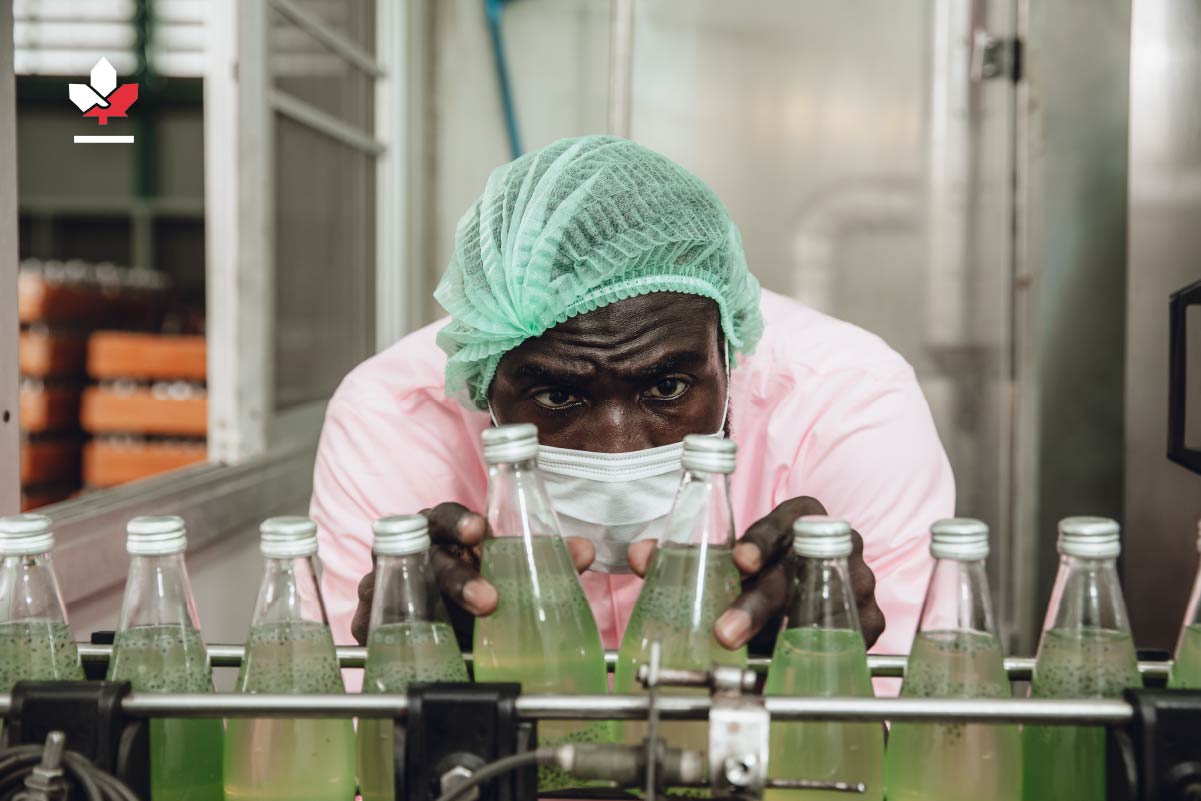To Eat or Not to Eat: 6 Jobs in Canada's Food Industry
January 16, 2024
|
Dive into the delectable world of career choices as we explore the labor market of Canada's food industry. From the meticulous artistry of a Food Technologist crafting flavors to the hands-on mastery of a Butcher sculpting culinary masterpieces, each job beckons individuals to embrace their passion for food.
Immerse yourself in a gastronomic adventure through the diverse career landscape of Canada's food industry!
6 of The Best Jobs in Canada’s Food Industry

Here are 6 of the best food industry jobs in Canada, with National Occupational Classification (NOC) codes and average annual salaries from Canada’s Job Bank.
Food Technologist
Average Annual Salary in Canada: 70,509.45
NOC Code: 94143
Food Technologists are the architects behind the flavors we savor. They blend science with creativity, developing new food products, improving existing ones, and ensuring that every bite is a delightful experience. From researching ingredients to experimenting with cooking techniques, they play a pivotal role in shaping the culinary landscape.
A bachelor's degree in food science, chemistry, or a related field is typically required. Specialized knowledge in food processing, quality control, and regulatory compliance is vital. Food Technologists analyze food components, collaborate with chefs, and stay abreast of industry trends. Their responsibilities include ensuring product safety, quality, and compliance with regulations.
Most in-demand provinces and territories in Canada: Alberta, Manitoba, Ontarro
Butcher
Average Annual Salary in Canada: 50,000.46
NOC Code: 63201
Butchers are the unsung heroes behind the scenes, transforming raw meat into culinary masterpieces. They possess a deep understanding of different cuts, ensuring that each portion is prepared with precision. In the world of sustainable and ethical dining, butchers are key players in promoting responsible meat consumption.
While formal education isn't always required, apprenticeships or vocational training in butchery provide invaluable hands-on experience. Butchers excel in knife skills, meat fabrication, and customer service. Their responsibilities include selecting, cutting, and packaging meat, as well as educating customers on various cuts and cooking techniques.
Most in-demand provinces and territories in Canada: Alberta, Manitoba, Nova Scotia, Ontario
Find out more about how to immigrate to Canada as a butcher.
Chefs
Average Annual Salary in Canada: 52,640.25
NOC Code: 62200
Cooks and chefs are the creative forces in the kitchen, turning raw ingredients into culinary delights. From line cooks meticulously preparing dishes to executive chefs orchestrating the entire kitchen, each role contributes to the symphony of flavors on the plate. Formal culinary education from accredited institutions or apprenticeships is common.
Practical experience in various kitchen roles is often crucial for career progression. Cooks and chefs master culinary techniques, flavor profiles, and menu planning. They manage kitchen staff, ensure food safety, and stay ahead of food trends to keep their offerings innovative.
Most in-demand provinces and territories in Canada: Manitoba, Nova Scotia, Ontario, Prince Edward Island, Yukon
Laborers in Food and Beverage Processing
Average Annual Salary in Canada: 48,037.08
NOC Code: 95106
Laborers in food and beverage processing are the backbone of large-scale food production. From sorting and packaging to operating machinery, they ensure the efficiency and quality of the production line. While formal education may not be mandatory, on-the-job training and a strong work ethic are essential.
Specialized certifications in food safety and handling may be beneficial. These laborers are adept at operating machinery, adhering to safety protocols, and maintaining the quality of food products. Teamwork and attention to detail are vital in this fast-paced environment.
Most in-demand provinces and territories in Canada: Prince Edward Island
Livestock Laborers
Average Annual Salary in Canada: 48,950.72
NOC Code: 85100
Livestock laborers are the stewards of the animals that ultimately contribute to the food industry. From feeding and maintaining the health of livestock to overseeing breeding programs, their work ensures a sustainable and ethical supply chain.
While formal education may vary, experience in animal husbandry and specialized training in livestock management are advantageous. Livestock laborers care for animals, monitor their health, and implement breeding programs. They play a critical role in ensuring the ethical treatment of animals in the food production process.
Most in-demand provinces and territories in Canada: Prince Edward Island, Nova Scotia, Ontario
Find out more about the top 3 Canada work visa programs for farm workers.
Agricultural Service Contractors and Farm Supervisors
Average Annual Salary in Canada: 57,025.99
NOC Code: 82030
Agricultural service contractors and farm supervisors are the conductors of agricultural symphonies. They oversee farming operations, manage resources, and ensure the successful cultivation of crops that form the foundation of the food industry. Agricultural degrees, coupled with practical experience, are common pathways.
Strong knowledge of crop management, pest control, and sustainable farming practices is essential. These professionals coordinate planting and harvesting schedules, manage farm budgets, and implement sustainable practices. They are pivotal in ensuring the efficient production of crops for the food industry.
Most in-demand provinces and territories in Canada: Prince Edward Island, Nova Scotia
Benefits of Working in Canada’s Food Industry

Here is a list of major benefits associated with working in Canada’s food industry.
Abundant Opportunities for Growth and Development
In the Canadian food industry, the table is set for continuous growth and development. From entry-level positions to executive roles, this sector offers a diverse array of opportunities. Professionals can carve their path, fostering skill enhancement and climbing the career ladder in a dynamic and evolving field.
Canada’s Culinary Diversity
Canada's food scene is a harmonious symphony of culinary diversity, reflecting the nation's multicultural tapestry. Working in this industry means immersing oneself in a world of flavors. From traditional dishes to innovative fusions, employees explore and contribute to Canada's rich and varied gastronomic landscape.
Robust Job Security in Canada’s Stable Food Industry
Amidst the unpredictable waves of the job market, the Canadian food industry stands as a beacon of stability. The constant demand for food ensures robust job security, providing professionals in this sector with confidence and stability in their career pursuits.
Healthy Work-Life Balance in Canada’s Food Industry
Unlike some high-stress professions, the Canadian food industry often promotes a healthy work-life balance. This equilibrium allows individuals to savor not just the flavors in their creations but also the sweet moments in life, fostering a fulfilling and sustainable career.
Networking Opportunities in Canada’s Food Industry
The Canadian food industry thrives on connections. Working in this sector opens doors to a vast network of professionals, chefs, and food enthusiasts. The potential for collaboration, mentorship, and growth through networking is immense, creating a supportive community within the industry.
Competitive Compensation Packages in Canada’s Food Industry
In Canada's food industry, dedication and skill are aptly rewarded. Competitive compensation packages ensure that hard work translates into financial stability. This reflects the value placed on professionals in the industry and makes it a lucrative and rewarding career choice.
Canada’s Food Industry’s Innovation and Creativity
For those with a flair for innovation, the Canadian food industry is a playground of possibilities. Professionals have the opportunity to contribute to developing new recipes, culinary techniques, and innovative approaches to food production. Creativity is not only encouraged but celebrated.
Sustainability of Canada’s Food Industry
Joining the ranks of the Canadian food industry means contributing to a greener tomorrow. Many establishments actively adopt eco-friendly practices, emphasizing sustainability in food production. This commitment aligns with the global movement towards responsible and environmentally conscious practices.
Immigrating to Canada in the Food Industry

Here are key pathways designed to welcome skilled individuals into Canada's thriving agrifood landscape.
Agrifood Pilot
The Agrifood Pilot is a specialized immigration initiative targeting experienced workers in the agri-food sector. This pilot program recognizes the significance of agriculture and food processing in Canada's economy, aiming to attract skilled professionals to contribute to its continued growth.
Find out more about the Agrifood Pilot.
Rural and Northern Immigration Pilot (RNIP)
The RNIP extends a welcoming hand to immigrants seeking opportunities outside major urban centers. Many regions participating in this pilot program actively seek individuals with expertise in the agricultural and food industry, recognizing the importance of these skills in fostering rural economic growth.
Learn more about the Rural and Northern Immigration Pilot.
Agriculture Worker Stream
The Agriculture Worker Stream is part of the Temporary Foreign Worker Program (TFWP), allowing foreign workers to contribute to Canada's agricultural sector. This stream addresses the demand for labor in primary agriculture, welcoming skilled individuals to fill crucial roles within the farming community.
Seasonal Agricultural Worker Program (SAWP)
The Seasonal Agricultural Worker Program (SAWP) is designed to address the seasonal labor needs of Canadian agriculture. It allows foreign workers to temporarily work in Canada to support agricultural activities during peak seasons, ensuring a steady workforce for farmers facing seasonal demands.
FAQs
Where Can I Find Food Industry Jobs in Canada?
Food industry job openings in Canada can be found on various online platforms such as CareersInFood.com, LinkedIn, Indeed, and Workopolis, which list thousands of available positions across the country.
Are There Part-Time or Full-Time Opportunities Available In The Food Industry in Canada?
Yes, the food industry in Canada offers both part-time and full-time job opportunities, allowing individuals to choose positions that align with their schedule and career goals.
